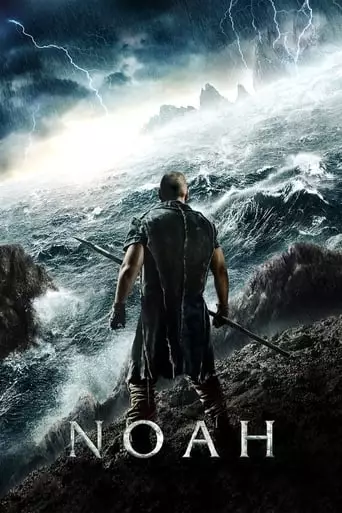
Noah (2014) Watch Online Free
A man who suffers visions of an apocalyptic deluge takes measures to protect his family from the coming flood.
In Noah (2014), directed by Darren Aronofsky, the biblical tale of Noah’s Ark is reimagined with a darker, more dramatic tone. The film opens with a young Noah witnessing the death of his father, Lamech, at the hands of Tubal-Cain, the leader of a violent, industrial society. As Noah grows into an adult (played by Russell Crowe), he is haunted by visions of a great flood, a divine punishment meant to cleanse the Earth of humanity’s sins. These visions compel Noah to seek guidance from his grandfather Methuselah (Anthony Hopkins), who gives him a sacred seed, leading Noah to begin building the Ark with the help of mysterious beings called the Watchers—fallen angels who were cast out of heaven for aiding humanity.
As the flood approaches, Noah’s family, including his wife Naameh (Jennifer Connelly), sons Shem (Douglas Booth), Ham (Logan Lerman), and Japheth (Leo McHugh Carroll), and adopted daughter Ila (Emma Watson), join him on the Ark. Meanwhile, Tubal-Cain gathers an army to seize the Ark, hoping to survive the flood. The story delves into Noah’s internal conflict as he grapples with his understanding of God’s will, particularly regarding the fate of humanity. The film culminates with the flood, testing the faith and moral convictions of Noah and his family.
Divine Wrath and Mercy One of the central themes in Noah is the tension between divine wrath and mercy. The Creator’s decision to destroy humanity is portrayed as a response to the overwhelming sin and violence that has taken root on Earth. The film emphasizes the grief that the Creator feels, suggesting that the flood is as much an act of sorrow as it is of judgment. This theme challenges viewers to reflect on the consequences of humanity’s actions on the environment and each other.
Environmentalism and Stewardship The film incorporates a strong environmental message, highlighting the destructive impact of human greed and exploitation of the Earth’s resources. The Watchers, who are depicted as beings of light encased in stone, represent the fallen angels who aided humanity’s descent into corruption. Their eventual redemption through helping Noah with the Ark underscores the theme of stewardship and the need for humans to care for the Earth rather than exploit it.
Family and Sacrifice Noah’s journey is also deeply tied to the themes of family and sacrifice. His relationship with his family members, especially his sons, is strained as the flood nears. Noah’s belief that the Creator has chosen him to save only the innocent animals, and not humanity, creates conflict within his family, particularly with his son Ham. The film explores the sacrifices that Noah must make, not only in terms of his own personal beliefs but also in the emotional toll it takes on his family.
Morality and Free Will Noah’s understanding of divine will is a central conflict in the film. He believes that the Creator wants the human race to perish, leading him to contemplate the sacrifice of his own family to fulfill the divine plan. This moral dilemma raises questions about free will, destiny, and the consequences of interpreting divine will in a rigid, unyielding way.
After watching Noah, you will likely feel a mix of awe and contemplation. The film’s epic scale, combined with its deep emotional and moral dilemmas, leaves a lasting impact. You may feel a sense of awe at the visual spectacle of the flood and the Ark, but also a sense of sadness and reflection on the themes of divine judgment and human responsibility. The complex portrayal of Noah as both a righteous man and a deeply flawed individual will leave you thinking about the nature of faith, sacrifice, and the consequences of our actions. The film’s environmental message may inspire you to consider the importance of stewardship and the impact of human choices on the planet.
In the end, Noah is a film that challenges its audience to think deeply about the world we live in and the choices we make, both on a personal and global scale.
